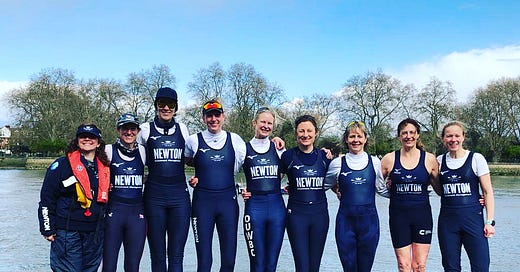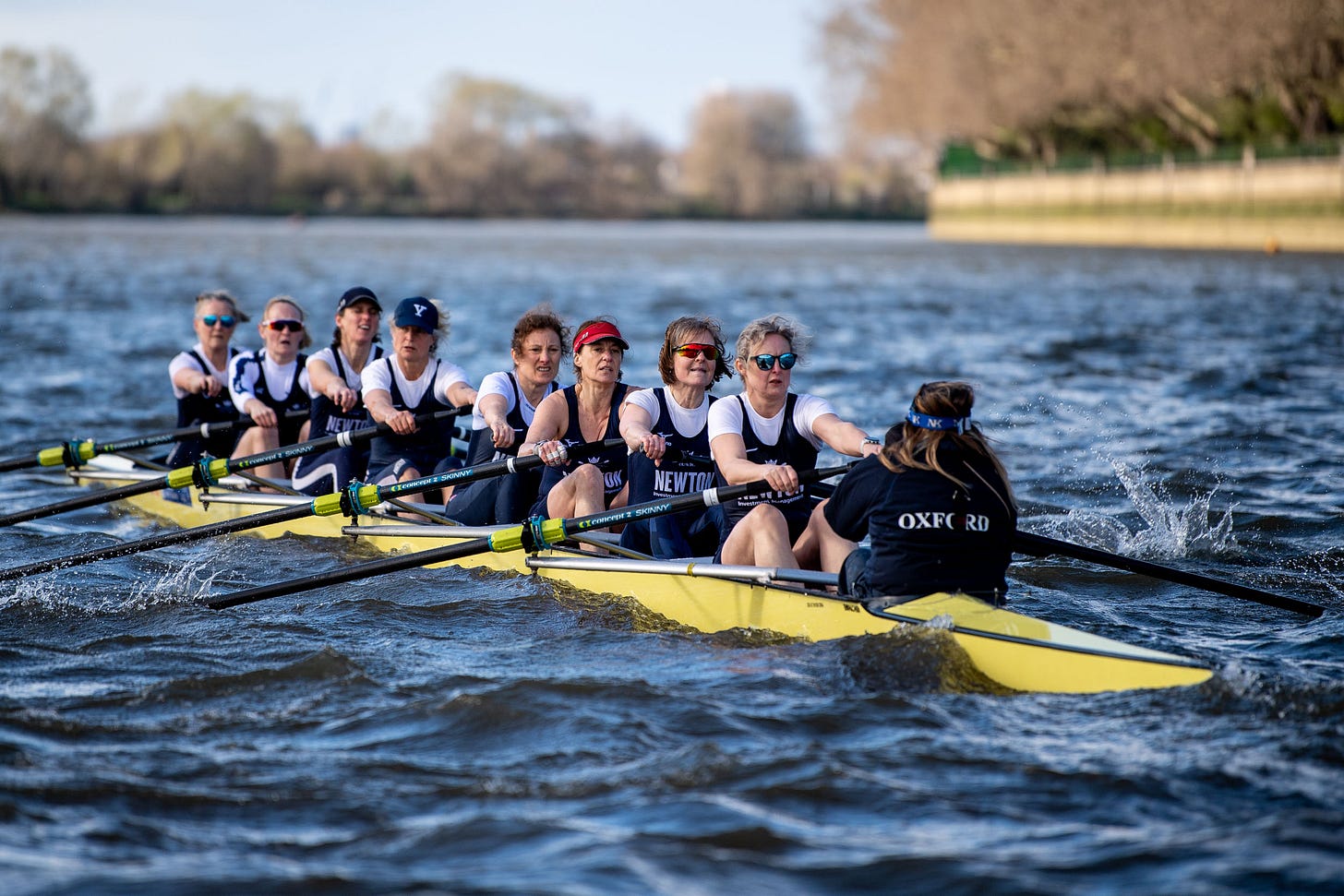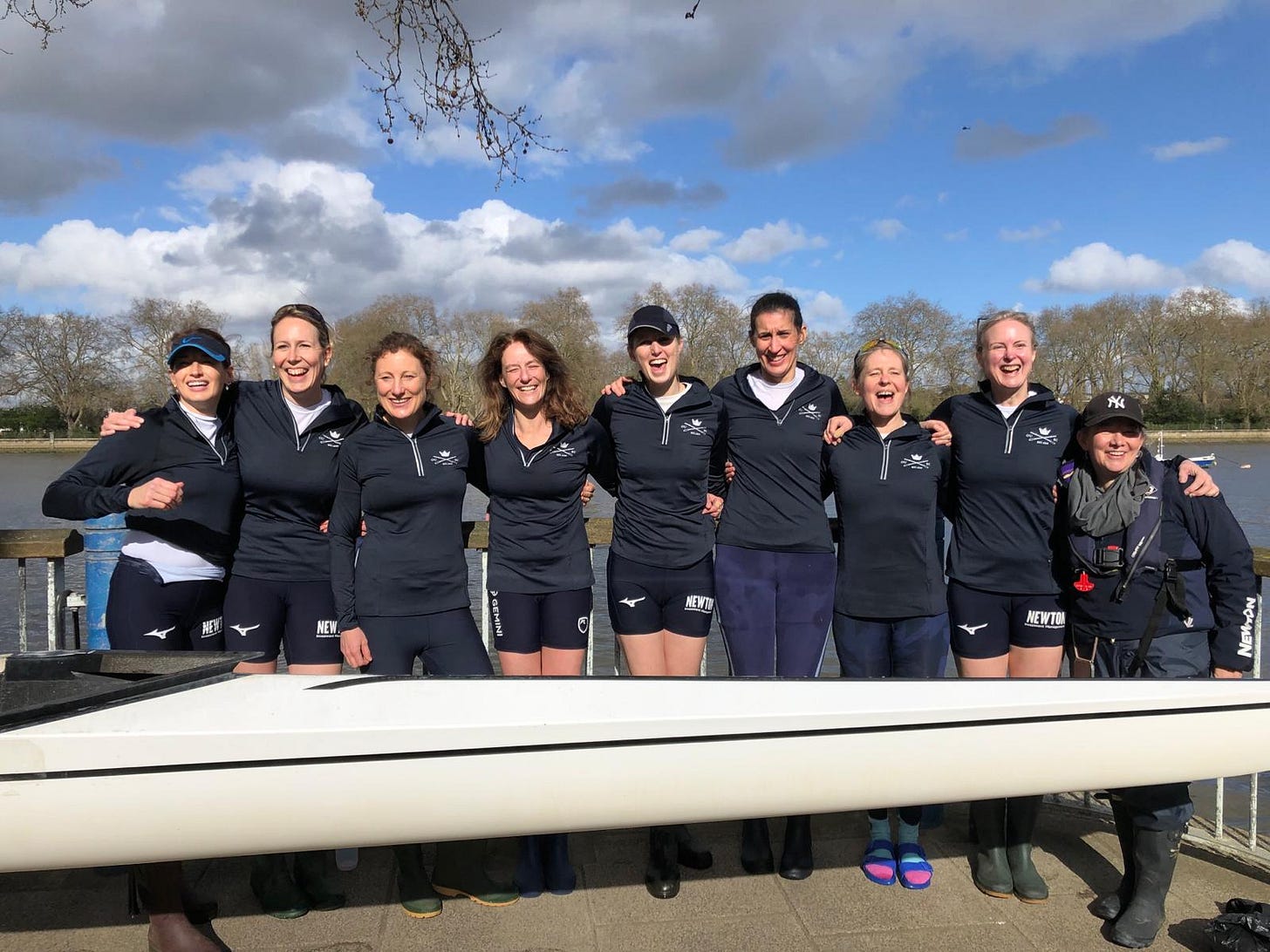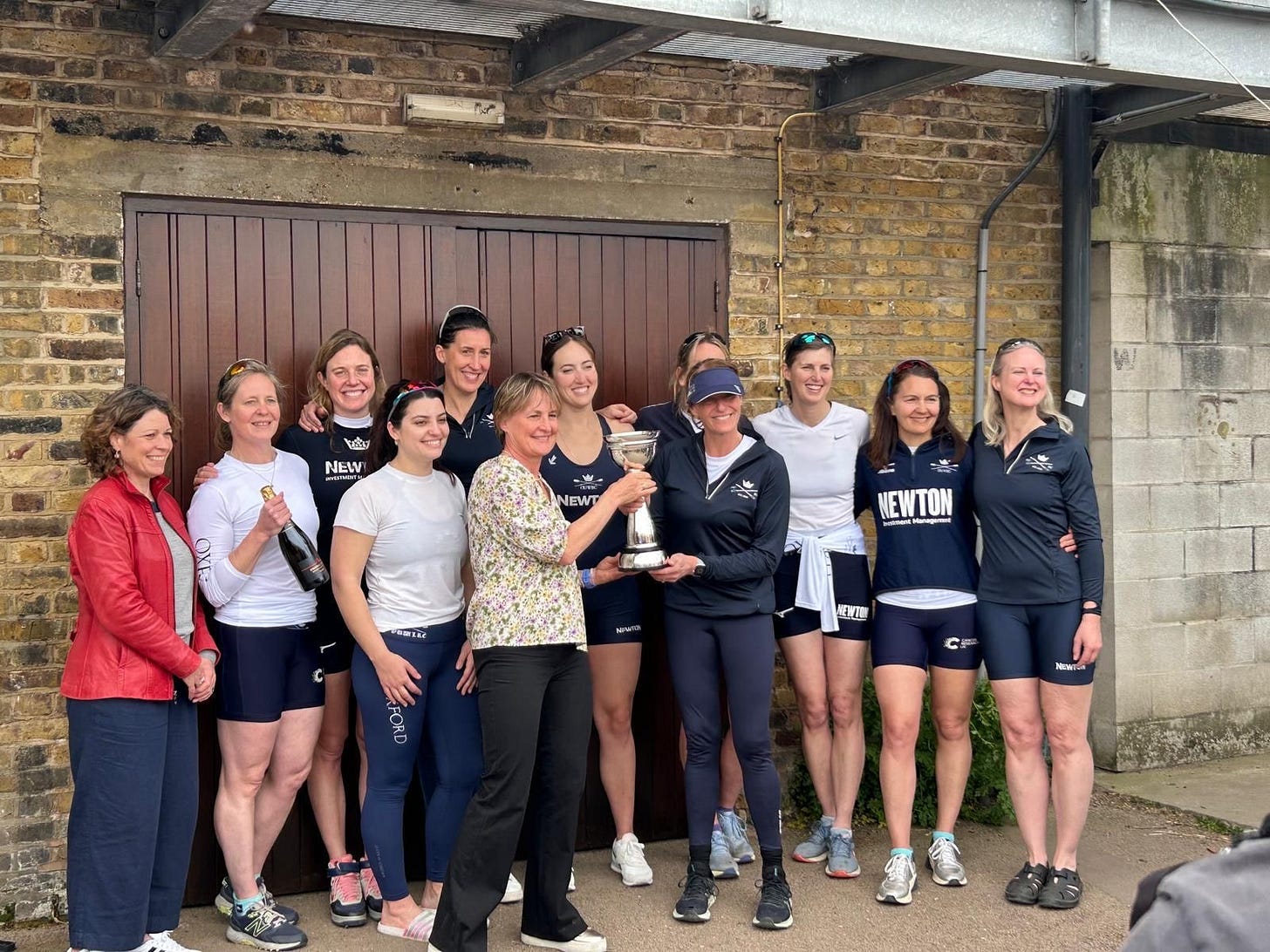How to develop a winning mindset
Fresh from the only Dark Blue victory against Cambridge, I contemplate what winning and losing means, and how we give ourselves a better chance of coming first
First of all massive apologies for missing a week and for the lateness of this post! Inevitably, it’s (rowing) rowing that has stopped play: but normal service will be resumed shortly. And spoiler alert: today’s newsletter is mostly about the Boat Race.
This weekend saw me participate in the Oxford and Cambridge Women’s Veterans Boat Race for the fourth time. In 2022, I took part in the first one, which we won (it helped to have double Olympic gold medallist Caryn Davies on board).
While I was fit from 3000 miles of Atlantic UT2 level exercise, I wasn’t as race fit as I am now - I had only been back from the ocean for a couple of months and was still lacking in glute strength, and with very sore hands. I remember clinging on for dear life in the six seat, just behind Caryn, desperately trying to avoid catching a crab.
Still, there was no chance of losing with her on board. It was fascinating to come so close to someone with such a confident mindset. I don’t think it even entered her head that we could lose. And so we didn’t.
Over the years in rowing, I have won and I have lost. Both my Boat Races were defeats in a similar era of Cambridge dominance, but my best victory came in 1995, when my Tideway Scullers crew won the National Championships and the Home Countries, as England.
Starting again as a Masters rower in 2019, I had to relearn how to race (and how not to let adrenalin get the better of me - there were a few occasions where the red mist descended, and I burned out midway through a race).
In the Talisker Whisky Atlantic Challenge in 2021, I took part in one of the closest battles for the Murden Trophy that the race has seen: it’s quite an extraordinary thing to be neck and neck with an invisible enemy for almost six weeks. I’m used to being able to see my opponent!
That was a “loss” but of course it doesn’t really feel that way now, except for not having an expensive watch on my wrist. Now, I look back and see that competition with One Ocean Crew as a means of getting across the ocean without going mad. Not everyone needs a focus to cross the Atlantic but many – even those who profess to be doing a challenge rather than racing – somehow find that they do too.
In some ways, I find those who can drift more and swim with the dolphins more remarkable: they have truly mastered the mindset of taking each day as it comes, and finding pleasure in every moment. But that’s the point of ocean rowing isn’t it – you find out who you really are during those six or so weeks.
Back to the Tideway, and a more visible enemy: Cambridge. The year after our inaugural victory over the Tabs, we suffered a brutal defeat against a crew stacked with Olympians – bronze medallists Anna Watkins and Sarah Winckless (this year’s Boat Race Chief Umpire, who did a fine job on Sunday); and silver medallist Cath Bishop.
In the Oxford crew that year, we had Olympic spare Alice Topley, and my sister Annabel, 1992 Olympic double sculler. But on blustery day Cambridge broke our spirit and our strength just past the Black Buoy on the Putney Embankment: on that occasion we’d realised our only chance was to go as hard off the start as possible, but our strategy failed against their superiority.
Then, in 2024, something exceptional: a dead heat (to us by 1ft). We’d realised that without such Olympian medal-winning might on board in the Oxford crew, we needed to make up for that with organisation and training. I learned a lot about the Boat Race that day – while the Men’s and Women’s Veterans only row to Furnivall Steps, just past Hammersmith, the course does take in the first big sweep of the race as you come in close to Hammersmith Bridge.
If you watched any of the racing this weekend, you will have seen that the crews that won the toss opted for the Surrey station – the Putney side. There is a slight advantage at the start of the race on Middlesex, but it disappears quickly. If you are on Middlesex and not ahead with clear water by Hammersmith, then you risk disaster.
On the other hand, if you are on Surrey and have lost contention with your competitor by Fulham Football Club, the advantage of the bend will become meaningless. And so we saw with Cambridge on Sunday: they lost the toss but managed to negate Oxford’s advantage by Fulham in the three races where they were on Middlesex (even in the restarted Women’s Race).
And so we became the only Dark Blues to win this year (although Oxford Men’s Veterans won, they were DQed for a blade clash). It’s probably no coincidence that we had two Americans on board again, both of who won for Oxford in the first women’s Boat Race to take place on the Tideway, in 2015.
Discussing the toss and which station we’d choose the day before the race, Emily Reynolds simply said, “It doesn’t matter: you win from both sides.”
The confidence and simplicity of her statement cut through what had been our rather more English approach to discussing the ins and outs and relative merits of each side. It was empowering to hear her words: whatever happens, you win.
In the end, we won the toss, chose Surrey, and entirely negated any advantage Cambridge might have had at the very beginning of the race by moving up on them from the very first stroke. It was a clinical annihilation of a crew that was almost the same as the one that annihilated us in 2023. We won by four lengths, and now hold the course record for the Women’s Veterans Race.
I sat down this morning to write about sport and midlife and what it’s like to compete as a Masters’ rower in my mid-50s – having stroked the Veterans Boat at age 53 and 364 days old. But my words have taken me somewhere else and what I’ve actually written about is winning and losing: probably no surprise, given that I’m still experiencing that winners’ high.
As ocean rowing becomes more competitive – we’ve seen how the WTR has evolved from a challenge to a race – these conversations about mindset become more relevant. We know Mark Slats has a winning mindset – but he backs that up with a punishing training schedule.
With our Oxford Veterans’ Boat, we realised we were never going to have the same Olympian firepower as Cambridge: but we neutralised their advantage by training harder than them, and backed that up by using an Empacher boat for the first time. By controlling the controllables, we gave ourselves a winning mindset.








